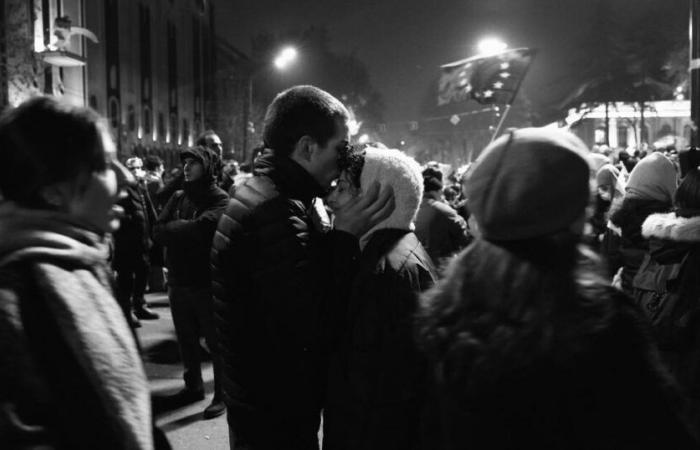In Libé's eye
published today at 8:22 a.m.
On October 28, President Salomé Zourabichvili denounced a “total falsification” of the Georgian legislative elections of 2024 and called for demonstrations the next day, in front of Parliament. Here, November 29 in Tbilisi.
Dina Oganova
The demonstrations intensified from November 29, after the government's announcement to suspend negotiations on Georgia's entry into the European Union until 2028.
Dina Oganova
Waving flags of the European Union and Georgia, several thousand people regularly gather in front of the Parliament in Tbilisi.
Dina Oganova
Since the Russo-Georgian war in 2008, around 18% of the territory (South Ossetia and Abkhazia) has escaped Georgian administration and is under Russian control.
Dina Oganova
Following the Russian invasion of Ukraine on February 24, 2022, Georgia officially submitted its application to the European Union on March 3 of the same year.
Dina Oganova
Riot police disperse protests using water cannons and tear gas.
Dina Oganova
According to the Interior Ministry, more than 400 demonstrators have been arrested since November 28, most for “disobedience” or “vandalism”.
Dina Oganova
The European Union is considering “measures” against Georgia due to the “brutal” repression of pro-EU demonstrations, a spokesperson for European diplomacy announced this Tuesday, December 10.
Dina Oganova
A new peak in tensions is expected this Saturday, December 14, when the Georgian Dream party will place far-right ex-footballer Mikheil Kavelashvili, a figure loyal to the pro-Russian government, as president.
Dina Oganova
Mikheil Kavelashvili's political views align with those of the far right, particularly regarding national identity, opposition to the recognition of the rights of sexual minorities, and promotion of the “purity of traditional values of Georgians ” against what he describes as a “putrid liberal fascism” imposed by the West.
Dina Oganova
Breaking with the government, the president, Salomé Zourabichvili, who only has limited powers, supports the demonstrators. She announced that she would refuse to relinquish her mandate until new legislative elections were held.
Dina Oganova
A call to demonstrate has been launched for the day of Saturday, December 14.
Dina Oganova
Dina Oganova, the Georgian photographer who signed these photos, explains why this anger is necessary: “For Georgia, it is very important to be part of the EU, first of all to feel safe.”
Dina Oganova
“We are a very small country and we have the most monstrous neighbor, Russia, which all our lives has been trying to eat us and take our territories.”
Dina Oganova
“We only have two options: join the EU or return to the Soviet Union, and we do not want the latter solution, especially the new generation who have no nostalgia for the past, who do not speak the Russian language , who does not want to live under dictatorship, who is the generation of freedom and who chooses the European future.”
Dina Oganova
“This is why we Georgians are on the streets right now, because this is our last chance to change our pro-Russian government and return to the European family.”
Dina Oganova


